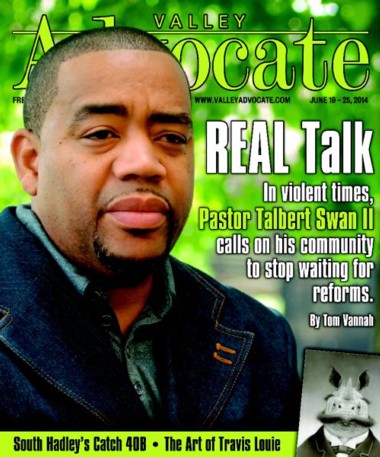Swan Expounds Selectively
Regarding the cover story on Rev. Talbert Swan (“Real Talk,” June 19, 2014): I am not one of Swan’s anonymous critics. The harsh reality is that he will expound on cases from Springfield, which are white-on-black incidents, while coming up short on answers for local problems. On Facebook, I mentioned a case where a black cop went for his gun when he stopped me—I had forgotten to turn on my headlights on a well-lit street. I could not understand the cop’s Southern black dialect. Swan replied that he spoke the same English everyone else did and called me “ignorant”—an answer that contradicts every linguist I have ever read, black and white.
The NAACP had nothing to say about the woman who was shot (riddled) for making a wrong turn, and became frightened when a cop pounded on her car. Black cops helped to do the shooting.
We all know there are failing parents, white and black, who are well aware that their kids are committing crimes. The Democrats, whom Swan supports, have been dismal failures at dealing with repeat offenders. Despite the demagoguery, the NAACP has been a lobby for weakening the laws against self-defense and for disarming law-abiding citizens to make sure the rest of us are defenseless against the products of the parental failures.
New Normal: Music for Free
James Heflin’s “Can Music Pay?” (June 12, 2014) raises an important problem. The overarching factor is the Napster-originated and Pandora/Spotify-engendered mentality that expects that music should be free. A whole generation is now in place that sees that as the norm.
It was never easy [for musicians to make a living] around here, but now it’s pretty much impossible. Although I’ve lived in Western Mass. my entire adult life, I’ve spent the majority of my performing career playing outside the area. It’s never been worth it here—unfortunately for me, because there are a lot of players I simply don’t know, and who don’t know me, because I was never part of the local scene. I couldn’t afford it.
The Tell-Tale Door
Regarding your story on Whately Town Hall (“Whately’s Silent Majority Turns Out,” June 19, 2014): As a professional preservationist and designer, I have to say the question raised about the cost of a door was telling. There may be real questions about the soundness of the restoration plan, so that many supporters of restoration may have voted against the plan.
Often architects and others—in too many cases, unfortunately—make assumptions that drive costs of restoration up to the point where the projects become impractical. Many times there are common-sense alternatives that are not explored. There are expensive ways to do things, and there are other ways to do things as well if people are creative. So the lesson of the story may be that it’s time to be more creative and sensitive to people’s feelings of hardship and the need to be frugal. Then a different plan can be designed so that Whately’s Town Hall can serve future generations.



